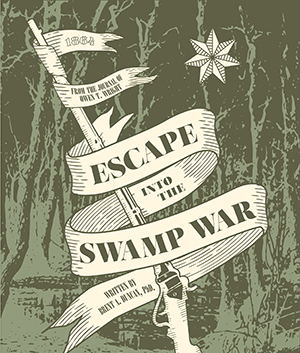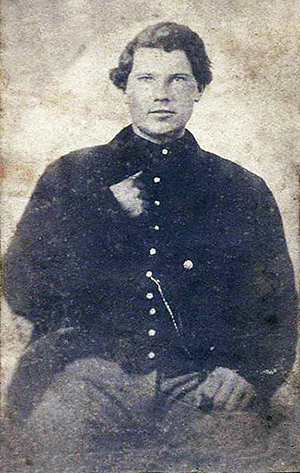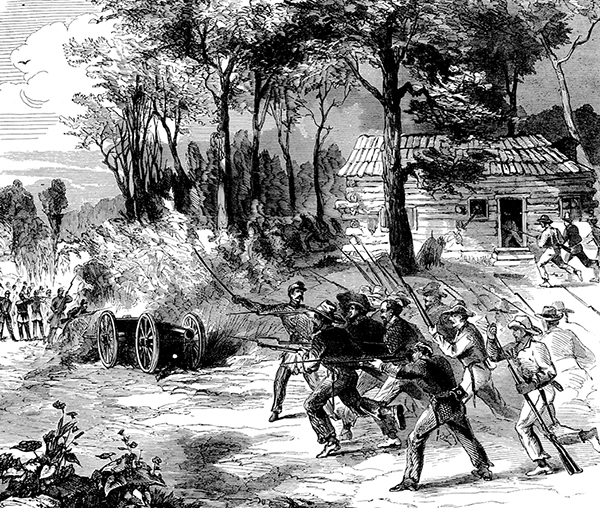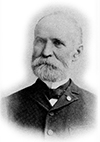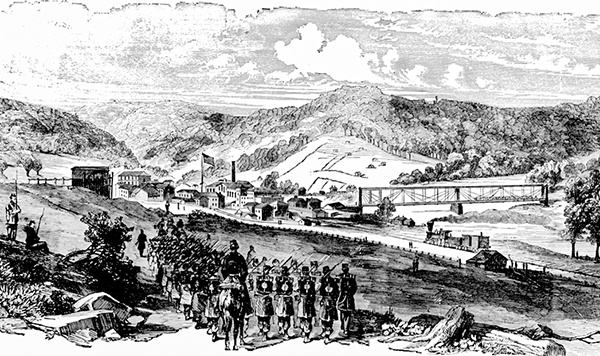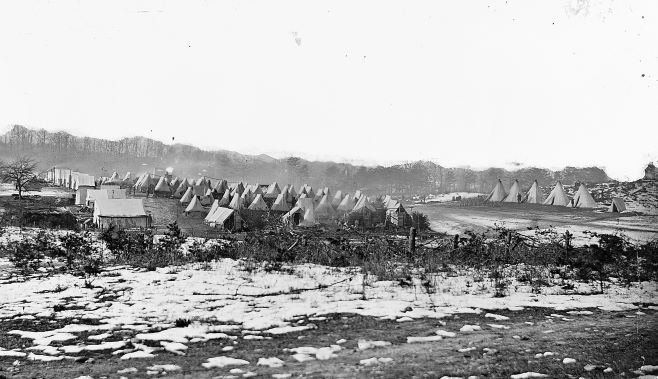Due to some missing pages, there is a gap in Owen's narration from November 8, 1861, to March 23, 1862. Nevertheless, Owen's exploits can be tracked through the writings of historians and the journals of his companions.
Due to some missing pages, there is a gap in Owen's narration from November 8, 1861, to March 23, 1862. Nevertheless, Owen's exploits can be tracked through the writings of historians and the journals of Owen's companions.
The regiment had commandeered houses and public buildings and settled in for the winter at Phillipi. Here, the men of the 14th Indiana were living in comfort, sharply contrasting the rigorous conditions of Cheat Camp. However, life was still stodgy. The men spent their days drilling on a diet of crackers. Christmas was cold.
First Christmas at war
On December 25, many of the soldiers were disappointed because they had not heard from home. For most, this was their first Christmas away from their families, and what one soldier called "the gentle and restraining influences and surroundings of Mothers, sisters, wives and female society." (1) Many followed the examples of their superiors and became riotously drunk.
For Christmas, the troops stationed in Phillippi had fights, drownings, and even stabbings. (2)
Back on the road
After the Christmas debacle, the 14th Indiana was ordered to go to Romney. In the words of Beem:
"We accordingly marched to Webster, where we got transportation on the Baltimore and Ohio Railroad to Greenspring Run. That was a bitter cold ride, as we were crowded together in open hog cars.…
"At Green Spring Run, the regiment vacated the well-ventilated cars and marched on the turnpike road to Romney. Distance 16 miles. It was a splendid road and never did the 14th march more neatly, keeping step to martial music nearly all the way.
At Romney, as at Phillipi, the men were quartered in houses.… Winter had now set in."
While stationed at Romney, the 14th Indiana participated in a lively skirmish at Bloomery Furnace where they attacked and broke up a rebel recruiting station.
On January 10, Owen and his companions were again ordered to move, this time to North Branch Bridge on the north branch of the Potomac near Cumberland. From there, they again boarded the Baltimore & Ohio Railroad for Paw Paw Tunnel, where they stayed the winter.
While stationed at Paw Paw Tunnel, the 14th Indiana participated in an expedition to Blue's Gap, about 20 miles away. At Blue's Gap, the Hoosiers — without loss to their troops — routed a considerable force of rebels. (3)

Death of General Lander
Another item of note at Paw Paw Tunnel was the sudden death and subsequent funeral of General Frank W. Lander. Lander had commanded the troops only briefly after General Reynolds resigned his post. Making him even less popular in death than in life, the troops had to stand at attention for three hours in frigid weather in honor of their fallen general.
In a letter home, one soldier wrote, "The boys repeatedly wished that no more generals might die." (4-G14) 75).
A new brigade
On March 4, 1862, the regiment packed up for Martinsburg, Virginia, where the 14th Indiana became part of a division led by Brigadier General James T. Shields. Nathan Kimball became the commander of Owen's brigade which now consisted of the 14th Indiana, the 4th Ohio, the 8th Ohio, and the 7th Virginia Regiments. This brigade would remain together until disbanded at the end of their three-year enlistment terms. (5) They would fight side by side in some of the most significant, violent battles of the war.
Before the Battle of Kernstown Shields took his division on the offensive to expel the Confederates from the Shenandoah Valley. General Thomas Jonathan Jackson had established his Rebel command in Winchester, a pleasant colonial town that was the hub for nine critical roadways. Due to its strategic importance, Winchester would become a hotbed of battles throughout the war, changing hands no fewer than 72 times.

Owen's journal resumes during the first in this series of entanglements. The short-term confederate enlistments had expired, and many of their troops had gone home. Greatly outnumbered with his reduced forces, Jackson prepared to stop Shields' 18,000 Union troops from advancing on Virginia. Despite being greatly outnumbered, Jackson prepared to stop Shields' 18,000 troops from advancing on Virginia. (1)
On March 22, Jackson's 4,200 troops were stationed on the hills above Winchester to meet Shield's advancing division. The 14th Indiana moved to Strasburgh Turnpike to confront Jackson. General Shields was injured in the ensuing battle. While being removed from the field, Shields passed his command to Colonel Nathan Kimball. (2)
Owen's narrative begins again at this point.
1 Clark, Champ, Decoying the Yanks, 43-4. Time-Life Books, Hereinafter referred to as Decoying the Yanks.
2 Battles and Leaders, 302 - 313


